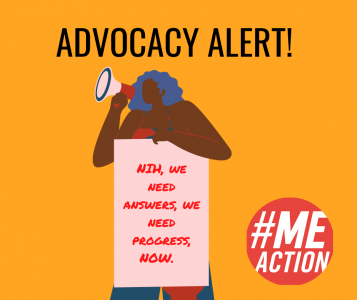Be sure to attend the telebriefing by the Trans-NIH ME/CFS Working Group this Friday (10/22) at 3PM ET. The National Institutes of Health (NIH) has many questions to answer about its lack of tangible progress or strategic acceleration of medical research for people with ME.
ME/CFS research opportunity being missed
Long COVID presents a rare opportunity to understand post-infectious illness. But despite the growing number of people with Long COVID who are now also being diagnosed with ME/CFS, NIH appears to be doing little to nothing to integrate ME/CFS into its Long COVID research initiatives (e.g. PASC, RECOVER).
This is a colossal mistake, not only is it a missed opportunity to better understand and treat ME/CFS, but inadequate integration of decades-long ME/CFS research, clinical expertise, and infrastructure will result in wasted resources and delayed delivery of much-needed treatments to patients suffering with Long COVID.
NIH needs to stop making vague promises that they “hope for breakthroughs” and “spillover benefits” for ME/CFS and instead take immediate, concrete steps to ensure ME/CFS is tightly integrated into Long COVID research activities, and transparently share the details of how this is being done with our community.
ME/CFS research must not be an afterthought or proceed in an ad-hoc manner. The trans-NIH ME/CFS working group needs to start the strategic planning process for ME/CFS we were promised in 2019. Stalled funding for ME/CFS must be scaled up in order to drive more investigators into this critical research field.
Researchers, organizations write to NIH leadership
Earlier this year, ME/CFS researchers, #MEAction, OMF, and Solve M.E. wrote a joint letter to NIH leadership regarding the research agenda for PASC (Long COVID), including suggestions for RECOVER Initiative that would shed light on other post-infectious fatigue syndromes and ME/CFS. This letter expands upon the similar recommendations that were previously made to NIH by Body Politic, the Community Advisory Committee for the NIH ME/CFS Collaborative Research Centers, The Long COVID Alliance, and #MEAction.
NIH’s response back by Dr. Walter Koroshetz did not substantively address any of the specific recommendations. In fact, at an NIH RECOVER initiative public briefing on September 15th where a $470M grant to NYU was announced, the principal investigator Dr. Stuart Katz said that their research would not include other diseases as comparator groups such as ME/CFS. In addition, we are concerned that the current research protocol does not provide methods for identification of ME/CFS in Long COVID cohorts.
These and other events leave us deeply concerned that the NIH’s PASC strategy and RECOVER initiative are not effectively leveraging what has been learned about postinfectious illness through research into ME/CFS. #MEAction will continue to urgently advocate to NIH for people with ME and we will share more details about our plans to the community soon.
In advance of Friday’s telebriefing by the Trans-NIH ME/CFS Working Group both #MEAction and Solve M.E. have submitted a list of questions about ME/CFS research that we are requesting they address during the meeting. Please join us at the telebriefing and make sure NIH hears your voice that ME/CFS research needs to be made a priority!






3 thoughts on “Is NIH blowing another opportunity to advance ME/CFS research?”
I have always believed that the NIH and the CDC were influenced/manipulated by the pharmaceutical companies. It may be a good idea to get the pharmaceutical companies on our side. They would ‘make a killing’ on medicinal treatments and cures for ME/FS, Long COVID, MS, and other post-viral diseases……which will likely be found to be many more than we realize.
I have had ME/CFS for 27 years, leaving me housebound and recliner/bedbound for the past 7 years. Both my husband and I caught Covid-19 in March of 2020, but were not sick enough to go to the hospital to be intubated, under advisement of our doctor. We both have been trying to cope with having Long-Covid ever since. On July 29, 2021, I was rushed to the ER because of severe POTS, crashing ME/CFS and Long-Covid, and asthma. The ER was packed wall to wall with mostly Covid positive patients. I spent 20 hours on a gurney in the hallway, surrounded by Covid positive patients, some refusing to wear a mask, with my husband by my side. At least we had our Moderna Vaccines in the Spring. Days later, we came down with break-through Covid. We are alive, but we are living in HELL. Please light a match under the NIH butts to throw all the money needed to develop great meds. treatments, and cures for ME/CFS, Long-Covid. and all post-viral diseases (which may include MS. Chronic Lyme, Alzheimer’s, Lou Gherig’s Disease, and more possibilities).
thank goodness for MEAction! Wonderful work as always. Thank you.
Another dog-and-pony show that will not inform anyone and will not result in progress for patients. No questions will be answered in an honest way. Everything they say about their future plans will be qualified with “hopefully” and a hundred reasons why they can’t do what needs to be done. None of their good intentions will include dates, dollar amounts, concrete goals or any other evidence of a good-faith effort to find answers and promote proper treatment of patients.
Maybe someday people will throw away their rose colored glasses and see that NIH still has a ME public relations program instead of an ME research program.
Comments are closed.